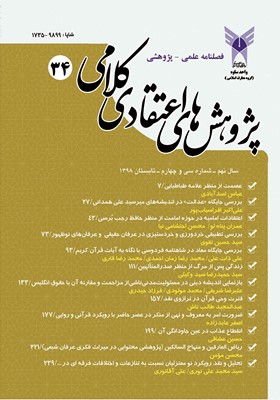بازنمایی اندیشه دینی در مسئولیت مدنی ناشی از مزاحمت و مقارنه آن با حقوق انگلیس
محورهای موضوعی : کلام اسلامیفرزاد حیدری 1 , علیرضا شریفی 2 , محمد مولودی 3
1 - دانشگاه آزاد اسلامی، سنندج
2 - دانشگاه پیام نور
3 - دانشگاه ابوعلی سینا
کلید واژه: اندیشه دینی, تصرف, مزاحمت, حقوق مالی, ضرر, مسئولیت مدنی,
چکیده مقاله :
مسئولیت مدنی ناشی از مزاحمت در حقوق مالی یکی از حوزه های مهم مسولیت مدنی است. افراد از طریق تصرفاتی که در ملک خود انجام می دهند و یا در جریان اجرای حق خود، ممکن است باعث ایجاد مزاحمت و ورد ضرر به غیر گردند. این بحث محل تلاقی حقوق اموال و مسولیت مدنی است. ازسوی مالک حق هرگونه تصرف وانتفاع در ملک خود را دارد (ماده 30 ق.م) ازطرفی دیگر حق مالکیت، محدود به این حق طبیعی وقانونی است که به مالکیت دیگری خسارتی وارد نشود (ماده 132 ق. م و اصل 40 ق.ن ا) قانون مدنی راجع به مسئولیت مدنی مالک حکم صریحی ندارد؛ شرایط وارکان آن را نیز بیان ننموده است؛ لذا با بررسی تطبیقی موضوع به روش تحلیلی – توصیفی این نتیجه حاصل شد که تصرف زاید بر متعارف اگربا عث ایجاد مزاحمت درحقوق مالی و زیان همسایه گردد، خواه مورد نیاز متصرف باشد یا مورد نیاز وی نباشد، موجب مسئولیت مدنی متصرف است. ومطلق بودن حق، متعارف بودن فعل ورفع حاجت، رافع مسئولیت نیست. ودر هرحال قاعده لاضرر بر روابط ناشی از مجاورت وهمسایگی حاکم است و تصرفات متصرف تاحد عرفی ناشی از مجاورت قابل تحمل است. برای اینکه مصادیق خاص دستورهای اخلاقی را به دست آوریم به دین نیازمندیم و این وحی است که میتواند دستورهای مبتنی بر باور و اعتقاد را در مورد خاصی با حدود خاص و شرایط و لوازمش تبیین کند
Civil liability from nuisance in property laws is one of the major areas in civil liability. People may cause nuisance or inflict harms to the latter through exercising their rights of occupation in properties. This subject matter is the area at which property rights and civil liability converge. On the one hand, the proprietor reserves an unlimited right of occupation in his/her property (Article 30 of the Civil Law). On the other hand, the right to property is restricted to this natural and legal right that the latter's property receives no damage (Article 132 of the Civil Law, and Principle 40 of the Islamic Code). The Civil Law does not have an explicit decree as to the civil liability of the proprietor and has not enumerated its provisions or elements either. Therefore, by comparative study of the subject, and via the analytical-descriptive method, it was concluded that the extra occupation of the reasonable would have the result of civil liability, if it would create nuisance in the property law and damage to the neighbor, whether it is intended or unintended for the proprietor. The absoluteness of the right, reasonableness of the act and satisfaction of needs shall not remove liability. However, the rule of "Prohibition of Detriment" governs the relations arising from vicinity and neighborhood, and the occupation by the occupier is customarily endurable by the vicinity law.
